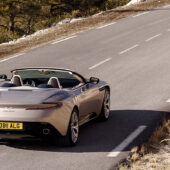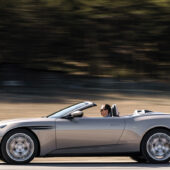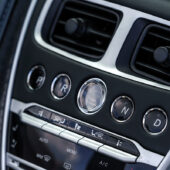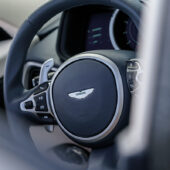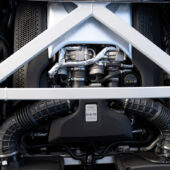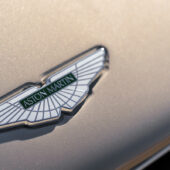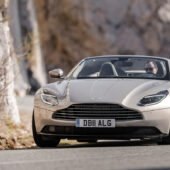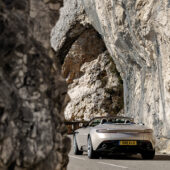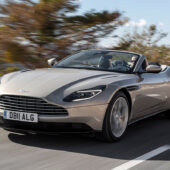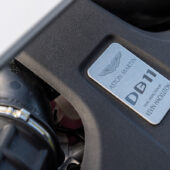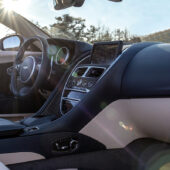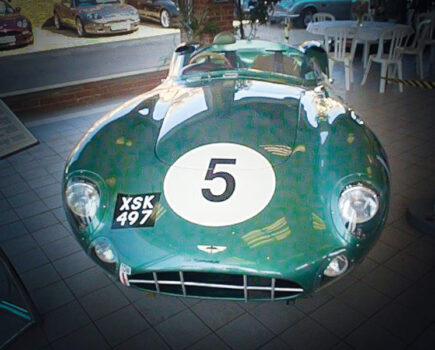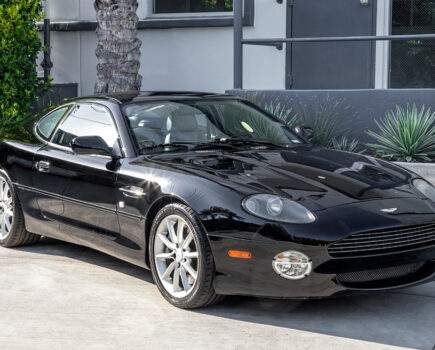We reacquaint ourselves with the DB11 V8 Volante, the car that successfully continued the open-top Aston Martin line
Words: Tim Pitt
The Aston Martin DB11 Volante is a car that makes you feel like an A-list movie star. The drop-top sister to the DB11 coupe must, of course, be driven everywhere roof-down, with sunglasses on, and as a result you’ll be even more aware of all the people stopping and staring at you. Don’t bother with years of acting classes; simply get one of these instead.
That’s the Aston Martin effect. Some sneer at Ferraris, Lamborghinis can be loutish and Porsches are ten-a-penny in places. An Aston Martin is still the supercar that people love – and this DB11 Volante convertible is one of the most attention-grabbing models of recent times. It also comes, of course, with the Mercedes-AMG V8 engine, a unit that Aston Martin considered ideal, enabling it to pitch the Volante’s list price below that of its Italian arch-rival – the Ferrari Portofino M.
The soft-top version’s launch was inevitable. As there was a DB9 Volante, there had to be a DB11 Volante, to satisfy all those for whom only an open car will do. And there’s a good number of such people. Maybe even more than ever, if Aston Martin could make a drop-top as driver-pleasing and complete as a coupe… which, of course, is exactly what happened via the 2018 launch of the soft-top DB11.
The delectable DB11 Volante is all about elegance. Like the coupe, it’s a refined design. It doesn’t shout about itself, isn’t packed full of extreme angles and OTT graphics. But it still stands apart thanks to its sumptuous lines. This is also a big car, a wide car, whose shark nose commands a lot of presence.
The talking point is the roof. Close work with the supplier enabled Aston Martin to create more form in its shape – there are more metal supports, so it’s smoother and less tent-like. The fabric is tidier too, with seamless joins and a flush-fit glass rear window. It lowers in 14 seconds and raises in 16, at speeds of up to 31mph (we tried it – operating the roof just below 30mph is an impressive moving spectacle).
The company is proud of how compactly the roof folds flat into the rear deck, enabling it to be nice and low, and giving the back end a clean look. There’s no ‘hump back’, like you get in some cabrios. In profile, it’s slim and lithe, despite its size. Roof down, it’s long and lean, an effect aided by a bold undercut to the doors and those oh-so-muscular rear wheelarches.
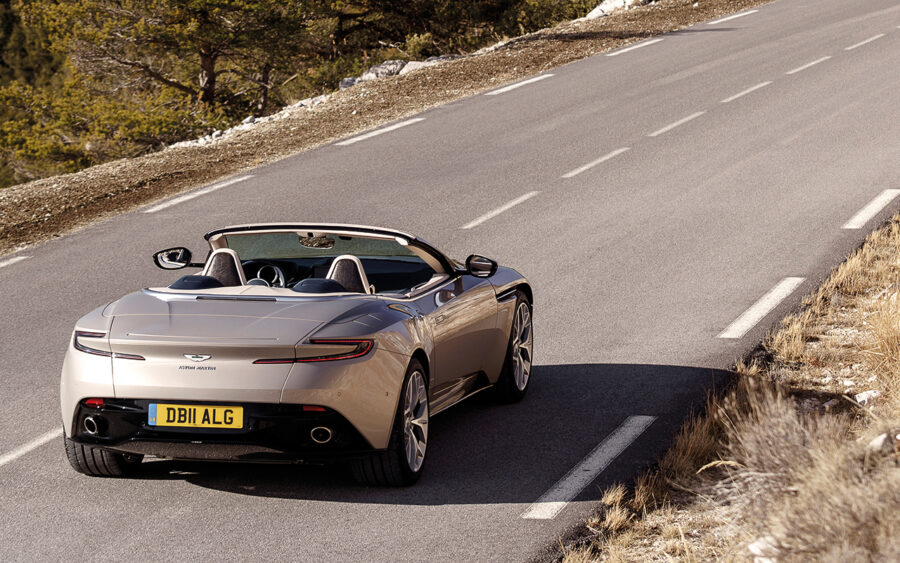
Unlike the coupe, there’s no inbuilt ‘air curtain’ duct at the rear. The shape of the roof alters the aero, so it’s not needed, say the designers. It’s also a cabrio in which you can reach the top speed of 187mph with the roof down as well as up. That’s what designing it alongside the coupe from the start (rather than as a follow-on project) does for you.
Forget simply keeping out the rain: Aston Martin demanded much more from the DB11’s fabric roof when creating the Volante. The firm says it tested how weatherproof the hood is in both the Arctic Circle and Death Valley, and adds that the K-fold mechanism is now so compact, boot space is 20 per cent greater than in the old DB9 Volante. The interior is bigger as well – and it was the first open-top Aston to have a heated steering wheel (ideal for roof-down winter trips if you forget the driving gloves).
Roof-up noise levels are kept in check by what was then the latest acoustic and insulation materials, which were among the eight layers making up the hood’s construction. Aston Martin loyalists, many of whom have owned several generations of Volante, were delighted with all the advances offered by the ‘most complete open-top Aston Martin ever built’. As well as working via the remote control, Aston boasted that the roof could be operated on the move, even with a hefty 31mph headwind. To make sure it all proved reliable despite these extremes, the test team subjected the roof to 100,000 cycles in special weather chambers – compressing a decade of use into a one-month test.
Creating it wasn’t as straightforward as making the DB11 coupe, said chief technical officer Max Szwaj. It’s all about retaining structural and dynamic integrity without adding mass: “To protect the former, you need strength and rigidity, but to preserve the latter, you need to keep weight to the minimum”.
Cue the DB11 Volante, a car 26kg lighter and five per cent stiffer than the old DB9 version. The end result was a ‘truly magnificent car’, one that Aston Martin claimed at launch ‘combines greater performance and agility with increased comfort, refinement and interior space for occupants and their luggage’. We wouldn’t disagree.
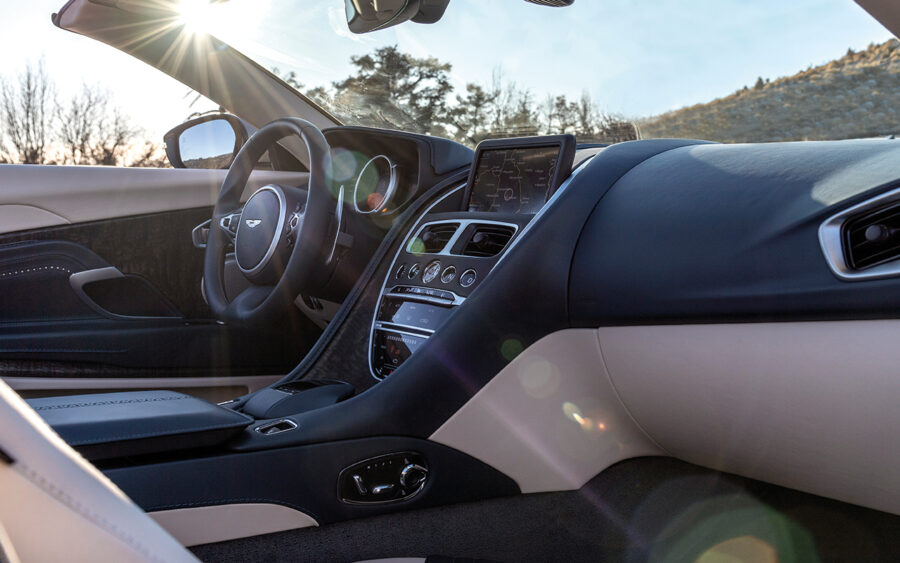
Inside, it’s the same as the coupe, albeit darker with the roof up (rear visibility is restricted) and immeasurably brighter and airier with it down. It’s nice to drop down so low into the seats, a treat to face such an advanced and interesting dashboard, although the complexity of it can be a little overpowering at first. Both the Mercedes-Benz media system’s controls and Aston’s own touch-sensitive buttons take some learning.
The digital instrument binnacle is neat, and reconfigures itself as you scroll from standard to Sport and Sport+ modes via the button on the steering wheel. A button on the other side lets you stiffen the dampers, should you want sportier handling without the associated engine drama. It’s complemented by an older Mercedes infotainment system, controlled by a rotary dial that’s just a little too fiddly. Touchscreen functionality would help, but isn’t available.
In the rear, there are two seats, but they’re less spacious than in the coupe. Aston has bought the rear bulkhead forwards to house the roof, which means they’re absolutely not for adults. They’re okay for kids, though – and equipped with Isofix mountings, offering enough space to mount a couple of child seats. Parents, take note: this soft-top’s able to take the twins.
Behind, there’s a 206-litre boot (20 per cent bigger than before), with an opening carved out to be as useful as possible. It’s not as practical as the coupe (which holds 260 litres), but it’s pretty decent for a svelte cabrio. If you want to lower the roof, however, you need to pull down a beautifully-trimmed divider panel that reduces space to 160 litres.
Aston Martin introduced some new trims to the Volante, including veneers for the backs of the front seats. They look rather smart, giving it a bit of a race-bred look, but only in the best possible taste. Expose them while you stand and chat with friends, thanks to the remote roof operation via the key fob. Just make sure that divider’s down in the boot, or the roof won’t operate…
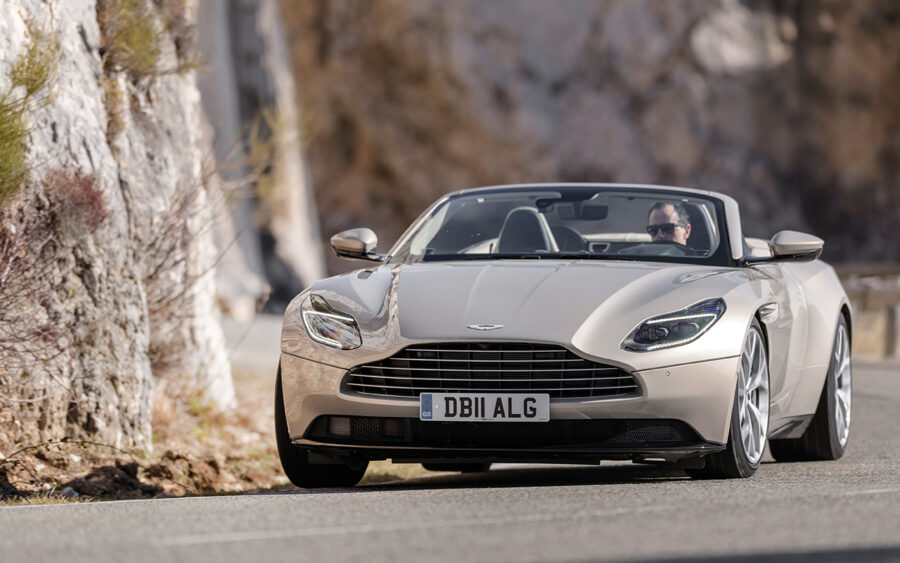
On the road
Before setting off, it’s essential to lower the roof… of course. The DB11 mechanism works smoothly and efficiently; it’s much quieter than before, with hushed operation and little of the cheap-sounding whirr of older models. Hold the button on the centre console down while you buckle up, and you’re ready to go almost straight away.
V8 richness dominates any first impressions. This gorgeous engine (surely Mercedes-AMG makes the best V8s in the world right now?) is even more fully exposed in the Volante, treating occupants to its creamy exhaust flutters as well as its upfront mechanical hum. Mercedes-AMGs favour loud, thunderous, howling and popping exhausts; Aston’s gone for the classier option, less vocal and more polite. It’s heavenly as a result.
At slow speed, this is a lovely car to drive. The turbo V8 serves up effortless torque, the eight-speed gearbox is impeccable and steering is nicely weighted and accurate. Good job: it’s a big car, feeling very wide (it’s the best part of two metres even without door mirrors – 2060mm including them), and threading it through tight, winding French roads (where else to drive it than the South of France?) was occasionally precarious. But so calming is the classic V8 hum, really, it’s fine.
Finally, we were free. Speeds could rise as big paddle-shifters were flicked down and up. Time for those two key cabriolet tests. One: body shimmer, caused by a loss of rigidity through chopping the roof. Box ticked here. You’ll barely notice it, and only sense a few slight flutters when looking for them. It doesn’t feel like the world’s ending when you clatter through a pothole, and there’s no vibration-induced buzz through the rear-view mirror.
Second: cabin wind blast. Again, a surprise; the DB11 Volante is a car you can use roof-down even at motorway speeds, without hairdos getting ruined or bodies being chilled to frozen. Although, proviso time, only with the wind deflector installed and raised, which takes the rear seats out of action. Do the same four-up and it’ll be the children acting as your wind deflector. Social services might have something to say about that.
Dynamically, Aston Martin’s objective was to get the Volante to feel as similar as possible to the coupe. Easier said than done. Because they’re less rigid, open-top cars often have to be softer than coupes, making them less sharp and incisive. But Aston has achieved its goal with the DB11 Volante. It’s a car that’s just as confident as the hard-top, and pretty well near as crisp, despite weighing over 100kg more (and the coupe isn’t exactly light).
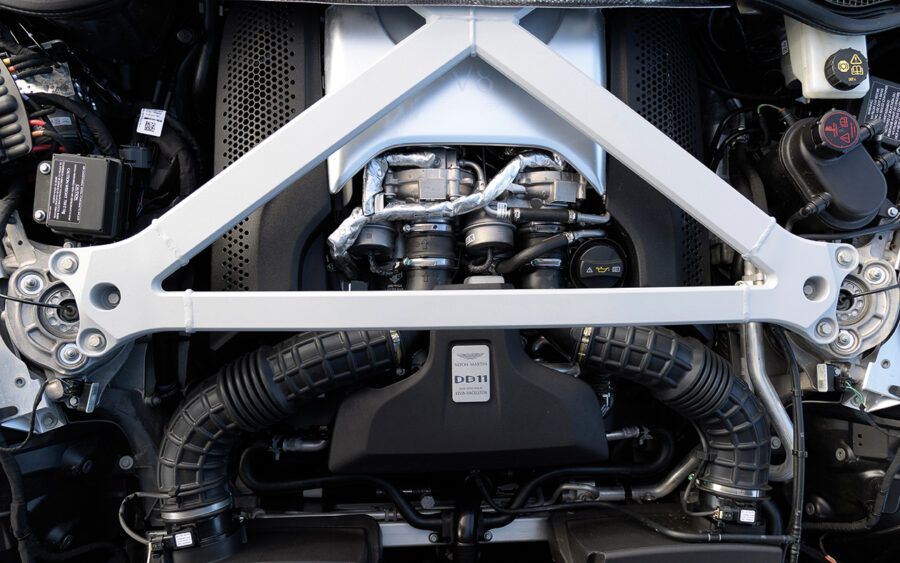
Its tautness encourages you to press on, and its balanced chassis rouses no nasty surprises. Clever damping copes with undulating surfaces without drama, and it soon becomes a GT cabrio you can confidently drive like a sports car (while being mindful of its width and size). On winding French mountain roads, I was soon diving into corners, leaning on the rear upon exit; okay, it’s a heavy car so isn’t quite sports car-lithe (it’s no McLaren 570S Spider, for example), but it can still be much more effervescent than the norm in a big GT car.
Turning up the settings to Sport and Sport+ doesn’t destroy the gliding, cushioned ride, but adds useful extra body control. Notably, it still doesn’t turn the exhaust note into a cacophony, either. The DB11 Volante always retains its cultured edge. It’s so rich and lovely, you really won’t miss a V12 engine. And with 60mph delivered in around four seconds, it’s not lacking in pace either. This is an effortless, rewarding and rich car to drive – and, yes, one that’s hard to split from the coupe unless you’re really going for it. For most customers, it’s a corruption-free convertible.
Oh, and roof up? As hushed as the coupe, pretty much. The roof is eight layers and does a splendid job of filtering out the exterior hubbub. Add in a cracking sound system and it’s a cushy cruiser. But, thanks to a heated steering wheel, heated seats and well-positioned air vents delivering powerful heat, you’ll only feel the need to raise the roof when it rains, not to escape from the cold. We drove it all morning in wintry French conditions, with nary a shiver.
Aston Martin DB11 Volante: our verdict
For the first time in memory, I came away from driving this convertible thinking I would take it over the coupe. I’m not particularly a fan of open-top cars, but the DB11 Volante still manages to serve up fresh air and V8 melody with almost none of the associated compromises. It won me over. You get to experience more V8 richness, more driving sensations, with few of the traditional open-top drawbacks. The handling is comparable to a coupe and, visually, it’s as classy and uncompromised. For Aston Martin aficionados, it provides an interesting conundrum.


